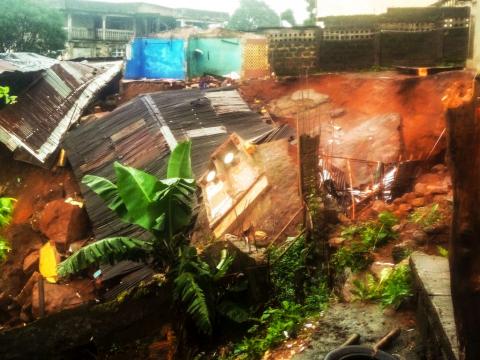By Mabinty M. Kamara
The 25 August heavy down pour in Freetown left over 60 residents in the Portee Community in the eastern part of the capital city homeless, Politico has gathered.
Residents and affected people say the heavy downpour led to the destruction of five houses.
The affected area, which falls within Ward 409 of Constituency 116, was in 2019 declared by the Office of National Security (ONS) as one of the disaster prone areas in the city, yet, apparently, little or no effort was made to evacuate the people.
Mohamed Sulaiman Jalloh, one of the affected residents, told Politico that he was asleep with his family at around 6am when a neighbour who was preparing for the morning Islamic prayer called his attention to collapsing fences outside. He recalled that they all rushed out for their safety. Shortly after, Jalloh narrated, nearby rocks began splitting open and the walls of the houses started falling down. He said they couldn't bring out anything apart from their lives and the clothes they had on at the time of the incident.
"I was trying to move out with my family when we saw the building collapsing. So there was no way for us to get things out. But we thank God that there was no loss of life,” he prayed.
Jalloh said himself and his family of eight people are now homeless. He went on to note that they had earlier noticed some cracks on the ground but that the landlord erected retaining walls with the hope of providing support to the building.
Jalloh called on the government and humanitarian organizations to support them during this time of grief.
Isatu Tarawalie’s three-story building was partly destroyed with adjourning apartments at the back of the building collapsing in to the huge ditch. The elderly landlady told Politico that they have been in the compound for the past 20 years and that it was only last year before the death of her husband that they noticed a crack on the structure which her late husband tried to repair.
"My husband was alive when we saw the crack last year. That was all what led to the rise in his pressure, which led to his death. And when he died, we did our best to mend it but we couldn't prevent the worst that has happened to us. We have a household of about 20 dependents, including children who are going to school. We have all now been left homeless," she lamented.
Isatu also appealed for support from government and other humanitarian organizations.
Councilor of Ward 409, Fatmata Cecelia Williams, described the disaster as the most serious to have occurred in her community and affecting such large number of people in a single day.
"They couldn't take out anything and they have been like this since yesterday, even to get food has been a difficulty, the Councilor said about the severity of the situation and its impact on the victims. She emphasised on particularly the impact on the school going children who she said needed “immediate action” from government.
Councilor Williams used the opportunity to sound a warning, thus: "This will serve as warning for those staying in disaster prone areas to move from there immediately. When the problem struck, you will be the one to feel the blunt."
Officials from the ONS visited the scene of the disaster on the 26th of August to assess the level of damage caused and the needs of the affected families, according to Research Officer attached to the Disaster Management Department of the agency, Umaru Sesay. He reiterated that the ONS had earlier warned the people to move away from the area when they were alerted of the cracks in 2019. Sesay said that notwithstanding, they have done the necessary assessment and have realised that the risk of living around the area was high and so they were contemplating appropriate action.
"We were alerted about this issue since 2019 by our volunteers. We came and did our assessment and asked the people to move out and relocate, but you know the challenge of accommodation in Freetown,” he pointed out.
“We did send early warning and it's the responsibility of the people to protect themselves," he added.
Sesay said they would consult with their partners in disaster management to map the way forward.
Disasters like this are not uncommon in Sierra Leone's capital, especially frequent during the raining season. They have been blamed largely on poor drainage systems and the manner in which people build houses, with little or no regard for waterways.
Copyright © 2020 Politico Online








